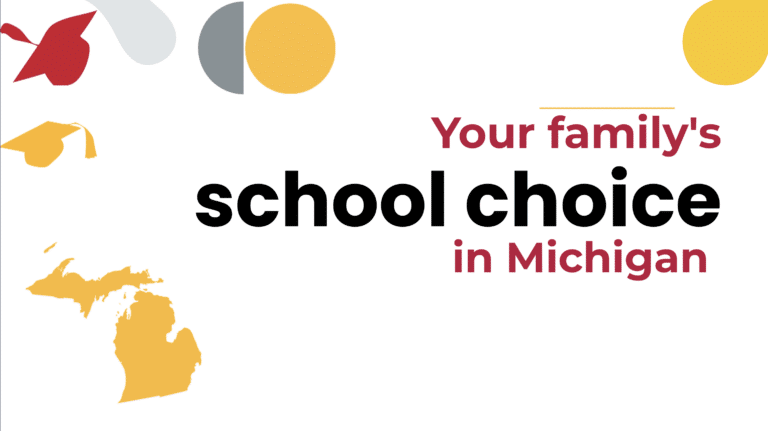Choosing a school? You’ve got options.
Choosing where your child goes to school is one of the biggest decisions you face. While it may feel intimidating to navigate your school options in Michigan and make a choice, you can do it! And remember, each child is unique. So, the “best” school for your child may be different than the “best” school for your neighbor’s child.
A starting point for finding a great school for your family is knowing your options. This guide will break down the main learning environments available in Michigan. In short, you can choose from traditional public schools, public charter schools, public magnet schools, private schools, online learning, and homeschooling. We’ll also talk about microschooling and mix-and-match learning.
Looking for special education options? You can learn what special education services are available in Michigan at the Ultimate Guide to Special Education.

- Traditional Public Schools
- Public Charter Schools
- Public Magnet Schools
- Private Schools
- Online Schools
- Homeschool
- Microschooling
Michigan Traditional Public Schools
Most often, Michigan families (72.5% students) choose traditional public schools. Traditional public schools are free to attend, open to all students, operated by school districts, and funded by taxpayers like you. On average, Michigan spends $14,085 per public school pupil each year. You can search your school’s spending and that of nearby schools at Project Nickel.
Some states have unrestricted open enrollment, which means that you can send your child to any public school, regardless of where you live or where the school is located. In Michigan, there is restricted open enrollment. Depending on the district and their school’s performance, parents may have the option to transfer their child to a different public school. If so, they are responsible for transporting their child to that school.
Open enrollment can be an important form of public school choice, widening parents’ options and ensuring that zip code isn’t the sole determiner of their education. Since Michigan districts set their own guidelines, dates and application procedures for school transfers can vary greatly. For example, Farmington Public Schools’ application deadline was January 27, 2023 for the 2023-2024 school year.
Find out more about public schools in your state at the Michigan Department of Education. You can also learn more at “Public Schools Without Boundaries: A 50-State Ranking.”
Michigan Charter Schools
You can also choose from charter schools! In Michigan, 10.1% of all K-12 students attend a public charter school. Charters are free, public schools open to all families. Charter schools are distinct from traditional public schools because they have extra freedom to innovate while being held accountable for student achievement. For example, the West Michigan Aviation Academy allows students to earn flight certifications and private pilot licenses. Charter schools can share the fruits of their innovation with traditional classrooms.
Michigan has more than 370 charter schools. These schools can be opened after they are authorized by school districts or colleges and universities. If there are more families seeking admittance to a charter school than there are seats, a lottery system is usually used to determine admittance. One of the state’s newest charter schools is KIPP Detroit: Imani Academy, which opened in 2022 as a kindergarten program.
Free transportation may be available to some students who attend charter schools in Michigan. Students with special needs who have an Individualized Education Program (IEP) are eligible to receive transportation assistance.
You can learn more at the Michigan Charter Schools Association.
Michigan Magnet Schools
Magnet schools are a third type of free public education; these schools allow kids to focus on a specific theme, like science or the performing arts. Michigan has several magnet schools throughout the state serving 9.5% of the K-12 student population.
The International Academy of Macomb, for instance, is a county-wide International Baccalaureate magnet school that provides opportunities each year for its students to travel the world. Meanwhile, Kalamazoo’s Maple Street Magnet School for the Arts recently expanded its Arabic course offerings. The Lansing School District offers more than 10 magnet schools or programs. Other districts with magnet offerings include Michigan City Area Schools, Detroit Public Schools, Saginaw Public Schools, Ann Arbor Public Schools, and more. If you live near a magnet school with a theme that interests your child, this could be an exciting choice for you.
Michigan Private Schools
Michigan has a plethora of private schools, both religious and non-religious ones. As you may know, private schools are nonpublic schools that charge tuition. There are about 900 private schools across the state of Michigan serving about 7.9% of the K-12 student population. Tuition costs vary widely, but the average in the state is $6,547 for private elementary schools and $11,405 for private high schools.
Michigan is one of the most constitutionally restrictive states for school choice, so there are currently no state-run scholarship opportunities that make private school more accessible to Michigan families. If you think a private school is best for your child but have funding concerns, you can ask whether there are any privately funded scholarships available. Also, the federal government allows parents to save for K-12 private school tuition using tax-preferred 529 savings accounts.
Learn more at the Michigan Association of Non-Public Schools, the Michigan Catholic Conference, and Private School Review: Michigan.
Michigan Online Learning
Whether your child wants to accelerate learning or needs a quieter environment, you may be interested in trying virtual school. Michigan offers many opportunities for online learning. As of fall 2021, there were at least 90 full-time online options for Michigan students, some available statewide and some district specific. Free, full-time online learning options serving students in grades K-12 statewide include: Highpoint Virtual Academy of Michigan, iCademy Global, LifeTech Academy, Lighthouse Connections Academy, Michigan Connections Academy, Michigan Great Lakes Virtual Academy, Michigan International Prep School, Michigan Online School, Michigan Virtual Charter Academy, My Virtual Academy, PrepNet Virtual Academy, Jenison International Academy, and Uplift Michigan. Students in grades 9-12 who would like extra academic support or credit recovery courses may be interested in considering Insight School of Michigan or MySchool@Kent. And students in grades 6-12 can also consider Great Lakes Learning Academy, WAY Michigan or West Michigan Virtual Academy.
About half of Michigan’s school districts participate in GenNET Online Learning, which offers online courses schools may use to meet their students’ needs. Many districts also have their own online schools for resident students. There are also regional offerings, like Success Virtual Learning Centers of Michigan, which blends online learning with in-person support at learning centers throughout the state.
Giving families still more options, Michigan Virtual is the state’s official virtual school and offers part-time online classes for middle-school and high-school students; in some cases, fees may apply. You can search statewide courses through the organization’s online course catalog.
We recently talked to Michigan Connections Academy about what online learning offers families. Bryan Klochak, superintendent at Michigan Connections Academy, told us that there are so many reasons why families choose virtual school. “There’s really no one ideal student or family [for online school] because everybody is coming to us for their own specific reason,” he said. “In our environment, we’re able to individualize, and that’s a big draw for lots of people.”
In Michigan, public school students in grades 6-12 who aren’t switching full-time to a cyber charter school may take up to two online courses per term. To read more about online learning in Michigan, check out the Digital Learning Collaborative’s state profile.
Michigan Homeschooling
Michigan families can also choose to homeschool, which allows for high levels of customized learning and flexibility. Homeschooling is the process of parents educating students at home; parents can homeschool in all 50 states.
You are not required to notify government or education authorities if you are homeschooling under Michigan’s homeschooling statute. However, submitting a notice of your intent to homeschool at the beginning of each school year is required if you are homeschooling as a nonpublic school. It is also recommended that you formally withdraw from your public school so your student is not marked truant.
If you choose to homeschool, you are required to teach specific subjects (like reading and math) but specific standardized tests are not required. Does your child love sports? Note that homeschool students in Michigan may be eligible to participate in sports at local public schools if they receive permission from their district.
Learn more at HSB, Inc., Metro Parent: How to Homeschool in Michigan, Home School Legal Defense Association – Michigan, Blue Water Homeschool Teens Cooperative, and the Michigan Christian Homeschool Network.
Michigan Microschools and Mix-and-Match Learning
Today, many Michigan families are mixing and matching school options to come up with new ways to personalize education. Microschools are one of these ways. A microschool refers to students gathering together in a small group – with adult supervision – to learn, explore, and socialize. Microschools can take a variety of shapes and legal forms, from homeschoolers coming together at an enrichment center to a private school committed to small classrooms. What microschools share in common is a commitment to small-group learning and close-knit relationships, along with an emphasis on children as individual learners.
Here are just a few real examples of microschools and related resources in Michigan:
The Future of Learning Council explores and promotes next-generation learning models, including microschools.
Blue Bridge School in Grand Rapids is a part-time, self-directed learning community for homeschooled children.
The online school WAY Michigan offers a microschool option to support online learning students.
AmplifyGR has worked with families in Grand Rapids on a variety of community and educational initiatives, including helping public school parents purchase supplementary services.
Remember, microschooling is more a mentality than a specific legal distinction in most cases. Often, a family participates in a microschool while legally homeschooling, or being enrolled in a private or online school. Michigan’s Department of Licensing and Instruction did release a memo back in 2020 detailing rules applying to school-age child care, some of which may apply to microschooling arrangements.
Search for Schools Near Me
Microschooling and Mix-and-Match Learning
How can it empower parents and help kids achieve their dreams?
7 Step Guide
Tips to help you find a school where your daughter or son will learn, succeed, and be happy.
Education Resources for
Michigan Parents
For additional information about school choices in Michigan, visit these resources:
Every state is different when it comes to school choice options.
Sign up below to get a detailed comparison:
"*" indicates required fields
